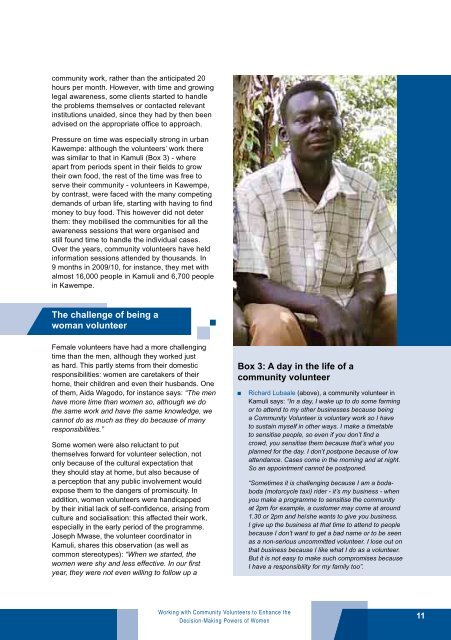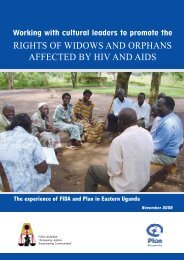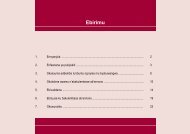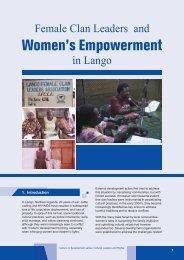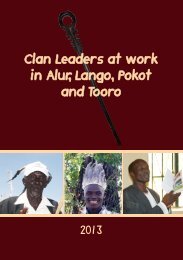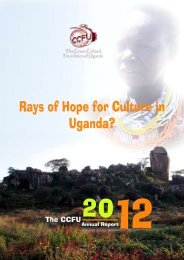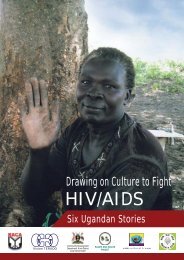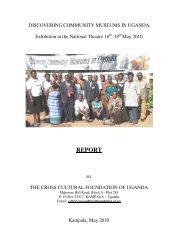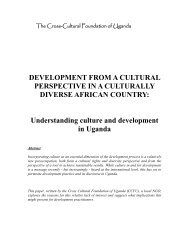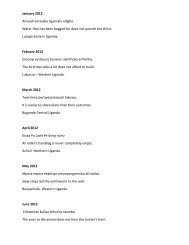Working With Community Volunteers to enhance the decision ...
Working With Community Volunteers to enhance the decision ...
Working With Community Volunteers to enhance the decision ...
Create successful ePaper yourself
Turn your PDF publications into a flip-book with our unique Google optimized e-Paper software.
community work, ra<strong>the</strong>r than <strong>the</strong> anticipated 20hours per month. However, with time and growinglegal awareness, some clients started <strong>to</strong> handle<strong>the</strong> problems <strong>the</strong>mselves or contacted relevantinstitutions unaided, since <strong>the</strong>y had by <strong>the</strong>n beenadvised on <strong>the</strong> appropriate offi ce <strong>to</strong> approach.Pressure on time was especially strong in urbanKawempe: although <strong>the</strong> volunteers’ work <strong>the</strong>rewas similar <strong>to</strong> that in Kamuli (Box 3) - whereapart from periods spent in <strong>the</strong>ir fi elds <strong>to</strong> grow<strong>the</strong>ir own food, <strong>the</strong> rest of <strong>the</strong> time was free <strong>to</strong>serve <strong>the</strong>ir community - volunteers in Kawempe,by contrast, were faced with <strong>the</strong> many competingdemands of urban life, starting with having <strong>to</strong> fi ndmoney <strong>to</strong> buy food. This however did not deter<strong>the</strong>m: <strong>the</strong>y mobilised <strong>the</strong> communities for all <strong>the</strong>awareness sessions that were organised andstill found time <strong>to</strong> handle <strong>the</strong> individual cases.Over <strong>the</strong> years, community volunteers have heldinformation sessions attended by thousands. In9 months in 2009/10, for instance, <strong>the</strong>y met withalmost 16,000 people in Kamuli and 6,700 peoplein Kawempe.The challenge of being awoman volunteerFemale volunteers have had a more challengingtime than <strong>the</strong> men, although <strong>the</strong>y worked justas hard. This partly stems from <strong>the</strong>ir domesticresponsibilities: women are caretakers of <strong>the</strong>irhome, <strong>the</strong>ir children and even <strong>the</strong>ir husbands. Oneof <strong>the</strong>m, Aida Wagodo, for instance says: “The menhave more time than women so, although we do<strong>the</strong> same work and have <strong>the</strong> same knowledge, wecannot do as much as <strong>the</strong>y do because of manyresponsibilities.”Some women were also reluctant <strong>to</strong> put<strong>the</strong>mselves forward for volunteer selection, no<strong>to</strong>nly because of <strong>the</strong> cultural expectation that<strong>the</strong>y should stay at home, but also because ofa perception that any public involvement wouldexpose <strong>the</strong>m <strong>to</strong> <strong>the</strong> dangers of promiscuity. Inaddition, women volunteers were handicappedby <strong>the</strong>ir initial lack of self-confi dence, arising fromculture and socialisation: this affected <strong>the</strong>ir work,especially in <strong>the</strong> early period of <strong>the</strong> programme.Joseph Mwase, <strong>the</strong> volunteer coordina<strong>to</strong>r inKamuli, shares this observation (as well ascommon stereotypes): “When we started, <strong>the</strong>women were shy and less effective. In our fi rstyear, <strong>the</strong>y were not even willing <strong>to</strong> follow up aBox 3: A day in <strong>the</strong> life of acommunity volunteerRichard Lubaale (above), a community volunteer inKamuli says: “In a day, I wake up <strong>to</strong> do some farmingor <strong>to</strong> attend <strong>to</strong> my o<strong>the</strong>r businesses because beinga <strong>Community</strong> Volunteer is voluntary work so I have<strong>to</strong> sustain myself in o<strong>the</strong>r ways. I make a timetable<strong>to</strong> sensitise people, so even if you don’t fi nd acrowd, you sensitise <strong>the</strong>m because that’s what youplanned for <strong>the</strong> day. I don’t postpone because of lowattendance. Cases come in <strong>the</strong> morning and at night.So an appointment cannot be postponed.“Sometimes it is challenging because I am a bodaboda(mo<strong>to</strong>rcycle taxi) rider - it’s my business - whenyou make a programme <strong>to</strong> sensitise <strong>the</strong> communityat 2pm for example, a cus<strong>to</strong>mer may come at around1.30 or 2pm and he/she wants <strong>to</strong> give you business.I give up <strong>the</strong> business at that time <strong>to</strong> attend <strong>to</strong> peoplebecause I don’t want <strong>to</strong> get a bad name or <strong>to</strong> be seenas a non-serious uncommitted volunteer. I lose out onthat business because I like what I do as a volunteer.But it is not easy <strong>to</strong> make such compromises becauseI have a responsibility for my family <strong>to</strong>o”.<strong>Working</strong> with <strong>Community</strong> <strong>Volunteers</strong> <strong>to</strong> Enhance <strong>the</strong>Decision-Making Powers of Women11


